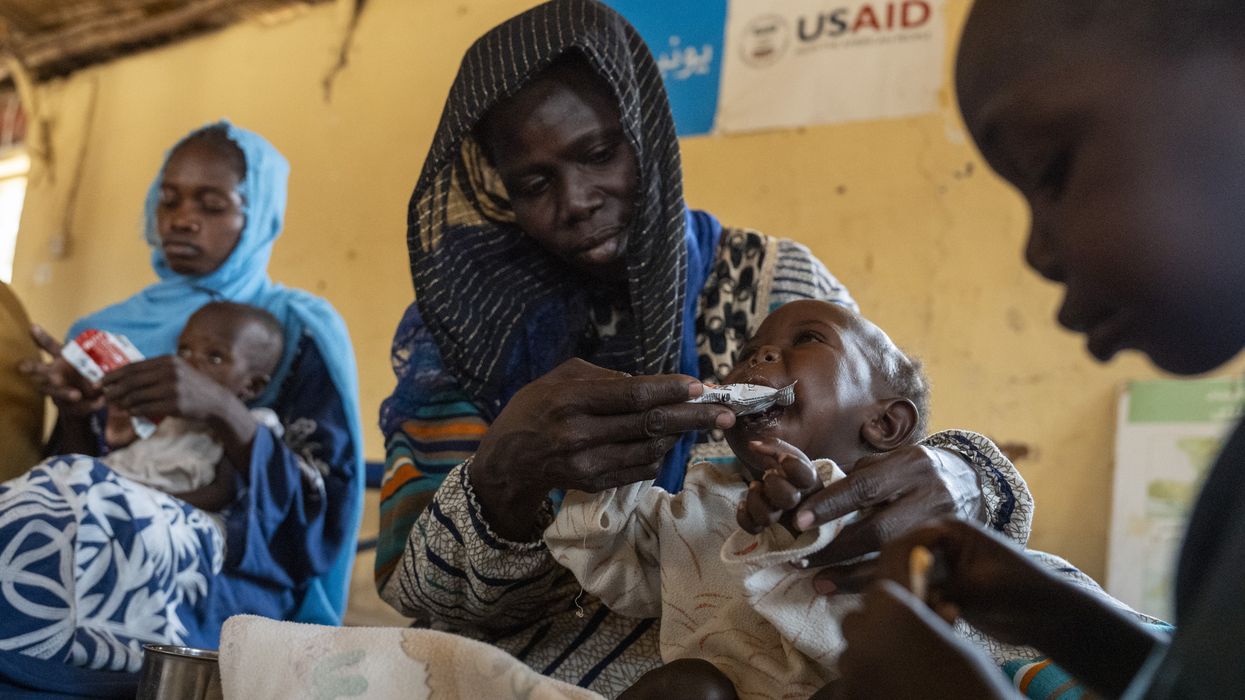February, 13 2012, 02:51pm EDT

40 Groups Call on Supporters to Oppose Keystone XL
24-hour Push Seeks Half a Million Petitions Against Climate-killing Pipeline
TUCSON, Ariz.
The Center for Biological Diversity joined more than 40 other environmental groups across the country today in a massive, 24-hour effort to express public opposition to the Keystone XL pipeline. The campaign aims to gather 500,000 petitions against the controversial project by noon on Tuesday. The signatures will be hand-delivered to the Senate, which is poised to vote on the project as early as this week.
"Keystone XL is a dangerous, shortsighted project that will enrich oil companies and leave oil spills, environmental destruction and climate catastrophe in its wake," said Noah Greenwald, endangered species program director with the Center. "This is the moment for Americans to voice their opposition to Keystone XL."
More than 12,000 people encircled the White House last fall to oppose Keystone XL.
President Barack Obama rejected the pipeline in January, but now Republicans in the Senate are pushing legislative language requiring the project to be permitted in 30 days.
Every day, the Keystone XL pipeline would transport up to 35 million gallons of dirty tar-sands oil from Canada across 1,700 miles, six states and hundreds of water bodies, posing a huge risk of oil spills. An existing pipeline called Keystone 1 has already leaked 14 times since it started operating in June 2010, including one spill that gushed 21,000 gallons of tar-sands crude. The new pipeline would directly threaten at least 20 rare and endangered species, including whooping cranes.
The extraction and refinement of tar-sands oil produces two to three times more greenhouse gases per barrel than does conventional oil, representing a massive new source of fossil fuels that leading climate scientist Dr. James Hansen has said will mean "game over" in our efforts to avoid irreversible global-warming calamity. Strip mining of oil from Alberta's tar sands is also destroying tens of thousands of acres of boreal forest and polluting hundreds of millions of gallons of water from the Athabasca River, in the process creating toxic ponds so large they can be seen from space.
At the Center for Biological Diversity, we believe that the welfare of human beings is deeply linked to nature — to the existence in our world of a vast diversity of wild animals and plants. Because diversity has intrinsic value, and because its loss impoverishes society, we work to secure a future for all species, great and small, hovering on the brink of extinction. We do so through science, law and creative media, with a focus on protecting the lands, waters and climate that species need to survive.
(520) 623-5252LATEST NEWS
China Announces 'Major Military Drills' Around Taiwan in Wake of Massive US Arms Sale
The Chinese military drills appear to be "an effort to gain air and maritime superiority and cut off external military support" for Taiwan, said one expert.
Dec 29, 2025
The Chinese military on Monday announced it was conducting "major military drills" around Taiwan weeks after the US announced an $11 billion arms deal with the island nation.
As reported by CNN, China is mobilizing its army, navy, and air force units around Taiwan in a move that it says should serve as a "serious warning" to any "external" forces interfering with the island, which China has long claimed as its territory.
Taiwan's government, meanwhile, responded by accusing China of conducting a campaign of "military intimidation," while vowing to "take concrete action to defend the values of democracy and freedom."
Su Tzu-yun, a research fellow at the Institute for National Defense and Security Research in Taipei, told German broadcaster Deutsche Welle that China's military drills appear to be "an effort to gain air and maritime superiority and cut off external military support."
William Yang, a senior Northeast Asia analyst at the International Crisis Group think tank, told DW that while Chinese military exercises around Taiwan are now regular occurrences, the speed with which China ramped up its latest exercises "shows that the Chinese People's Liberation Army is becoming increasingly capable of rapidly deploying forces to combat-ready positions."
Although China did not mention the US directly when denouncing "external" powers, CNN noted that the decision to launch military drills came weeks after the US reached an $11 billion arms deal with Taiwan that included HIMARS rocket systems, anti-tank and anti-armor missiles, drones, howitzers, and military software.
China responded to this arms sale directly last week by announcing sanctions against US defense firms including Boeing, Northrop Grumman Systems Corporation, and L3Harris Maritime Services, according to the Guardian.
In announcing the sanctions against US firms, a Chinese foreign ministry spokesperson emphasized that "the Taiwan issue is the core of China's core interests and the first red line that cannot be crossed in China-US relations," while warning that "any provocative actions that cross the line on the Taiwan issue will be met with a strong response from China."
Keep ReadingShow Less
'Trump's Economic Policies Did This': US Business Bankruptcies Surge to 15-Year High
At least 717 US companies filed for bankruptcy through November 2025—the highest figure recorded since the aftermath of the Great Recession.
Dec 29, 2025
Businesses in the United States have filed for bankruptcy this year at a level not seen since 2010 as President Donald Trump's tariff regime has jacked up costs for companies in manufacturing and other major sectors.
Citing data from S&P Global Market Intelligence, the Washington Post reported over the weekend that at least 717 US companies filed for bankruptcy through November 2025, the highest figure recorded since the aftermath of the Great Recession and a 14% increase compared to the same period last year.
"Companies cited inflation and interest rates among the factors contributing to their financial challenges, as well as Trump administration trade policies that have disrupted supply chains and pushed up costs," the Post noted. "But in a shift from previous years, the rise in filings is most apparent among industrials—companies tied to manufacturing, construction, and transportation. The sector has been hit hard by President Donald Trump’s ever-fluid tariff policies—which he’s long insisted would revive American manufacturing."
Recent data shows that the US has lost 49,000 manufacturing jobs since Trump's return to office.
The bankruptcy figures add to the growing pile of evidence showing that Trump's tariffs and broader policy agenda have harmed the US economy—weakening job growth, driving the unemployment rate up to the highest level since the Covid-19 pandemic, and worsening the nation's cost-of-living crisis.
Democrats immediately seized on the new reporting as evidence of Trump's failed stewardship of the US economy, messaging that's likely to be central as the 2026 midterms approach.
Trump's economic policies did this. pic.twitter.com/tRfcNxAyAU
— Sean Casten (@SeanCasten) December 27, 2025
Ken Martin, chair of the Democratic National Committee, said Monday that "when Donald Trump signed his Big Ugly Bill into law, he cemented the Republican Party as the party of billionaires and special interests—not working families, farmers, or small business owners."
"While millions of working families are already being squeezed to afford groceries, utilities, and rent, Trump chose to strip them of their healthcare and food assistance just so he could give his ultrawealthy friends and donors an extra buck," said Martin. "Make no mistake: Trump’s ‘signature achievement’ will be the nail in the coffin for the Republican majority when voters head to the polls next November."
Keep ReadingShow Less
Trump Slashes US Humanitarian Aid Pledge as His Cuts Kill Hundreds of Thousands Globally
One tracker estimates that the Trump administration's assault on foreign aid programs has killed more than 700,000 people so far—a majority of them children.
Dec 29, 2025
The Trump administration on Monday announced a commitment of $2 billion to United Nations humanitarian assistance efforts, a fraction of what the US has previously provided as President Donald Trump's foreign aid cuts continue to wreak deadly havoc worldwide.
The US State Department said the funds will be tied to reform efforts pushed by the administration, as it warns individual UN agencies to "adapt, shrink, or die"—all while giving massive handouts to billionaires.
"The agreement requires the UN to consolidate humanitarian functions to reduce bureaucratic overhead, unnecessary duplication, and ideological creep," said the State Department.
Al Jazeera reported that the reduced commitment "is a sharp contrast to the assistance of up to $17 billion the US has provided as the UN’s leading funder in recent years."
"The $2 billion will create a pool of funds that can be directed at specific countries or crises, with 17 countries—including Bangladesh, the Democratic Republic of the Congo, Haiti, Syria, and Ukraine—initially targeted," the outlet noted. "Afghanistan is not included on the list, nor is Palestine, which officials say will be covered by money included in Trump’s yet-to-be-completed Gaza plan."
The Associated Press observed that "even as the US pulls back its aid, needs have ballooned across the world: Famine has been recorded this year in parts of conflict-ridden Sudan and Gaza, and floods, drought, and natural disasters that many scientists attribute to climate change have taken many lives or driven thousands from their homes."
The new funding pledge comes after the Trump administration's lawless dismantling of the US Agency for International Development (USAID), which was the United States' primary body for foreign aid.
Experts say the destruction of USAID at the hands of billionaire Elon Musk and others inside the Trump White House has killed hundreds of thousands of people across the globe—and could kill millions more in the coming years.
A conservative tracker maintained by Boston University epidemiologist Brooke Nichols estimates that the Trump administration's assault on foreign aid programs has killed more than 700,000 people—a majority of them children.
In a blog post for the Center for Global Development earlier this month, Charles Kenny and Justin Sandefur wrote that "while quantification is difficult, there is little doubt many people have died as a result, and without action many more will die in the future."
Keep ReadingShow Less
Most Popular


